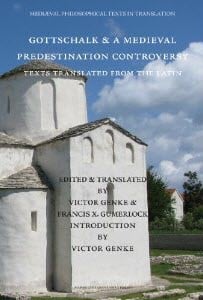 As I continue the explore the fascinating world of medieval Christianity, I have come across a very interesting theologian from the 9th century, Gottschalk of Orbais. (When Esther and I were considering baby names for our forthcoming son, I thought Gottschalk should be in the running, but shockingly, Esther was not with me.) Over Christmas break I read a bit of Victor Genke and Francis X. Gumerlock’s Gottschalk & a Medieval Predestination Controversy (Marquette 2010), which has a helpful introduction to Gottschalk’s life and theology (written by Genke) as well as the translations to a number of key texts concerning the predestination controversy he was engaged in.
As I continue the explore the fascinating world of medieval Christianity, I have come across a very interesting theologian from the 9th century, Gottschalk of Orbais. (When Esther and I were considering baby names for our forthcoming son, I thought Gottschalk should be in the running, but shockingly, Esther was not with me.) Over Christmas break I read a bit of Victor Genke and Francis X. Gumerlock’s Gottschalk & a Medieval Predestination Controversy (Marquette 2010), which has a helpful introduction to Gottschalk’s life and theology (written by Genke) as well as the translations to a number of key texts concerning the predestination controversy he was engaged in.
An interesting feature of Gottschalk’s understanding of predestination is his claim that foreknowledge and fore-ordination are simultaneous, because both occur in God’s eternal present. As he puts it, addressing God, “you have foreknown and predestined instantly, that is, without any interval, that is, at one and the same time before the ages, each and every one of your works” (as quoted on 56). This sounds a bit like Boethius’ doctrine of divine foreknowledge, although Gottschalk includes fore-ordination along with it. Gottschalk sounds to me here kind of like a mediating link between Boethius and the reformed tradition on the question of how foreknowledge and fore-ordination relate to human and angelic free will – although, as Boethius points out, there is a sense in which they are not fore-ordination or foreknowledge; they only seem so to us.
Gottschalk affirms a two-fold understanding of predestination, including the notion of reprobation. He writes: “the omnipotent and immutable God has gratuitously foreknown and predestined the holy angels and elect human beings to eternal life, and … he equally predestined the devil himself, the head of all the demons, with all of his apostate angels and also with all reprobate human beings, namely, his members, to rightly eternal death” (54-55). In addition, like his reformed spiritual descendents, Gottschalk defends his strong doctrine of predestination by linking it to the power of divine grace. If God does not sovereignly direct his grace, then that grace is not truly omnipotent, free, and effectual. As he puts it, going so far as to identity God with his grace, “is not grace God and omnipotent, which gratuitously saves and sets free whomever it wants?” (58).
Gottschalk had about as strong of a doctrine of divine sovereignty as one can have – certainly as strong as any who came after him in the reformed tradition. His writings on predestination sparked quite a controversy, earning a response from John Scot Erigena and invoking the wrath of some powerful monks around Northern Europe. Eventually he was tried, publicly flogged, and then imprisoned for life. He seems to have been a bit of a hot-head, and his aggressive style probably caused as much of the difficulty as his actual doctrine (if not more). For many of his most basic claims, Gottchalk could appeal to St. Paul, Augustine, and the Council of Orange (529), but Gottschalk seems to have particularly stressed the very points which went further than these. Gottschalk is thus proof that the (1) hard-core predestinarianism + (2) punchy attitude that has characterized certain tendencies in the reformed tradition has precursors way before the 16th century! He reminds me of the importance of the caution and restraint that characterized someone like Calvin’s approach to divine sovereignty.
As I’ve wrestled with the doctrine of divine sovereignty, I’ve eventually come to a place where I no longer feel any tension between it and human responsibility. I can’t necessarily given an argument along those lines, but that’s been my experience. This quote from C.S. Lewis’ Perelandra really resonates with me. It comes after Ransom has been struggling with whether to make a difficult choice of obedience.
“The whole struggle was over, and yet there seemed to have been no moment of victory. You might say, if you liked, that the power of choice had been simply set aside and an inflexible destiny substituted for it. On the other hand, you might say he had delivered from the rhetoric of his passions and had emerged in unassailable freedom. Ransom could not for the life of him, see any difference between these two statements. Predestination and freedom were apparently identical. He could no longer see any meaning in the many arguments he had heart on the subject.”



One Response
“As I’ve wrestled with the doctrine of divine sovereignty, I’ve eventually come to a place where I no longer feel any tension between it and human responsibility.”
That is one area I have had to consider and in the end, I just trust God to do what he will do and for me to act accordingly, as best as I know how. He gets the glory and I am his servant – there still is a tension to me, but that is where the mystery lies.
After reading this article, I ordered that book on Amazon. I had never heard of this particular historical controversy and it looks interesting to those of a Reformed proclivity. Thanks for writing this post… I found it most interesting!